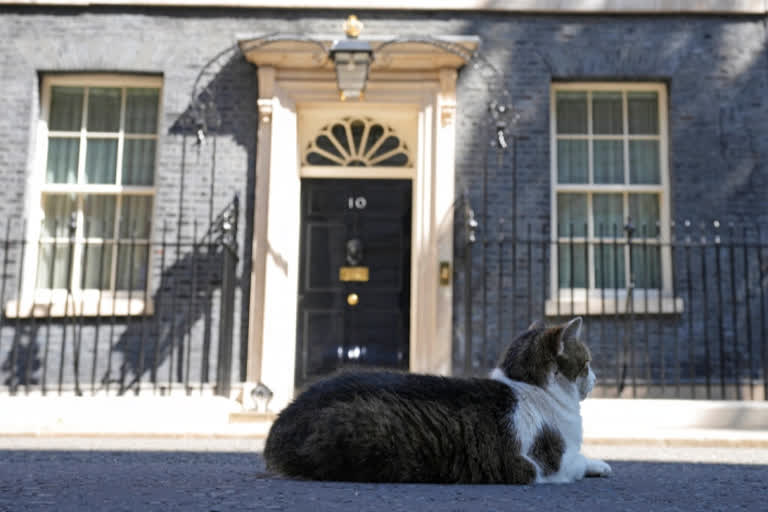London: Candidates to replace Boris Johnson as Britain's Prime Minister scattered tax-cutting promises to their Conservative Party electorate on Monday, as party officials set out rules to narrow the crowded field of almost a dozen candidates to two contenders by next week.
Little-known junior minister Rehman Chishti became the 11th candidate to declare he wants to succeed Johnson, who quit as Conservative leader on Thursday amid a party revolt triggered by months of ethics scandals. Other contenders include Foreign Secretary Liz Truss, former Treasury chief Rishi Sunak, Treasury chief Nadhim Zahawi, trade minister Penny Mordaunt, former health secretaries Sajid Javid and Jeremy Hunt, and backbench lawmakers Tom Tugendhat and Kemi Badenoch.
The new leader will be chosen in a two-stage election, in which the 358 Conservative lawmakers reduce the race to two candidates through a series of elimination votes. The final pair will be put to a ballot of party members across the country. Under Britain's parliamentary system, the new Conservatives leader will automatically become prime minister without the need for a general election.
The party's 1922 Committee, which runs leadership contests, announced that nominations will officially open — and close — on Tuesday. The first round of voting will take place Wednesday, and the second on Thursday, with candidates who fail to get at least 30 votes eliminated at each round. Candidates will need to be nominated by at least 20 lawmakers to get onto the first ballot, a number that may knock out some contenders before voting even starts.
The party aims to complete the parliamentary stage of the election before lawmakers break for the summer on July 21. That means a new leader is expected to be announced when the House of Commons returns on Sept. 5.
Many Conservatives are wary of leaving Johnson in office for too long, concerned a lame-duck leader is the last thing Britain needs with war raging in Ukraine, food and energy price increases driving inflation to levels not seen in decades, and growing labor unrest. Some also worry Johnson — brought down by scandals over money, rule-breaking and his handling of sexual misconduct allegations against lawmakers — could do mischief even as a caretaker prime minister.
In the wide-open leadership contest, contenders are striving to set themselves apart from the perceived front-runner Sunak, who already has the backing of more than three dozen lawmakers. Many have repudiated the tax increases Sunak introduced to shore up U.K. finances battered by the coronavirus pandemic and Brexit — a 1.25% income-tax rise for millions of workers, and an increase in corporation tax next year from 19% to 25%. Most candidates say they will scrap one or both.
Also read: Rishi Sunak launches bid to succeed Boris Johnson as UK PM
"I want to cut all taxes," said Hunt, who pledged to slash corporation tax to 15%. Truss said she would start slashing taxes "from day one," and Tugendhat said he would "lower taxes across every aspect of society." Sunak, whose resignation on Tuesday helped topple Johnson, has cast himself as the candidate of fiscal probity, and warned rivals not to tell the public "comforting fairy tales."
All the candidates are trying to distance themselves from the drift, disorganization and rule-breaking that sank Johnson — though most of them have served in his government, and some still do. They are seeking to appeal to an electorate of about 180,000 Conservative members that, in many ways, doesn't represent the country as a whole: It's older, whiter, more affluent and much more strongly in favor of Brexit, the country's departure from the European Union.
None has so far renounced Johnson's most contentious policies: Legislation to rip up parts of its Brexit deal with the EU, and a plan to send some asylum-seekers arriving in Britain to Rwanda that is being challenged in the courts. The party battle has already turned fractious. Rivals have criticized Sunak's record as finance minister, and Zahawi, the current Treasury chief, is fending off claims he is being investigated over his tax affairs. Zahawi said he was being "smeared" and was unaware of any investigation.
Tony Travers, a professor of government at the London School of Economics, said "it would be hard to exaggerate how nasty" the contest already is, with candidates' teams leaking about one another to the media. "It really is a war of all against all — and will get worse," he said.
Oddsmakers say Sunak is likely to be one of the final two contenders, but the race is highly unpredictable. Truss and Mordaunt both have strong support, while Tugendhat, a former soldier on the party's center-left, and right-wing rising star Badenoch have secured big-name support and could surprise more experienced rivals.
Johnson clung to power for months despite accusations that he was too close to party donors, that he protected supporters from bullying and corruption allegations, and that he misled Parliament about government office parties that broke COVID-19 lockdown rules.
But Johnson was brought down by one scandal too many — this one involving his appointment of a politician who had been accused of sexual misconduct. Johnson himself didn't plan to endorse a candidate. "I wouldn't want to damage anybody's chances by offering my support," he said. (AP)



